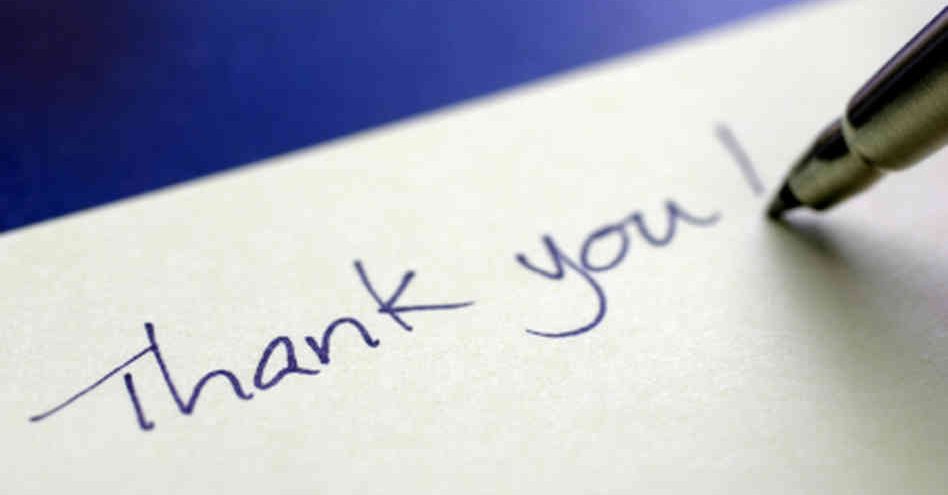QUESTION: What is the first thing you should do after you get home from a job interview (immediately after you rip off your uncomfortable interview outfit but before you pour yourself a stiff, cold drink)?
ANSWER: Write a thank-you letter to your interviewer(s).
If you’re like most job applicants, you resent the mere suggestion that there is still more to do for your target employer after the interview. Indeed, you probably rightly think that your interviewer(s) should thank you for putting on an interview outfit, trucking down to your interviewer’s office, and perhaps even graciously inventorying your weaknesses during your interview. But, fair or not, your fate hinges on your interviewer(s) opinion of you. And you will probably improve your interviewer’s opinion of you by sending him/her a thank-you letter because:
- Most applicants don’t bother to write thank-you letters. Therefore, your letter will help you stand out from the thankless masses.
- Your thank-you letter will brandish your fire-in-the-belly, manners, conscientiousness and dedication to follow-through — all prized traits.
- Your thank-you letter will remind your interviewer(s) of your strengths. As one hiring manager said, “If a letter is right in front of me, it is a tangible nudge that forces me to think about the applicant again — perhaps long after the interview has ended and the interviewee has left my office.” This is important because a busy interviewer who screens many applicants may quickly forget even outstanding applicants, particularly those that were interviewed early in the selection process.
CONTENT AND FORMAT
Your thank-you letter should be zippy and brief — no longer than several paragraphs, and certainly no longer than one page. Tailor your letter to your target job by:
- Thanking your interviewer for his/her time and trouble.
- Reaffirming your interest in your target job. Your succinct explanation of why your target job appeals to you should incorporate information you gathered during the interview.
- Mentioning your credentials that are most relevant to the needs of your interviewer.
- Adding any important information that you neglected to mention during the interview.
- Demonstrating your attention to detail. Your letter should be error-free. Double check the spelling and title of your interviewer(s). Spell-check and proof your thank-you letter and then get a second opinion on it from a trusted advisor.
HOW MANY LETTERS?
If you’re interviewed by more than one interviewer, send a thank-you letter to each interviewer. Why? Because you can’t assume that your interviewers will pass around a single thank-you letter among themselves. And because each of your interviewers probably has the power to make or break your case, you should use every opportunity to impress each of them.
If possible, tailor each thank-you letter to each interviewer by referring to something s/he said or something that is apparently particularly important to him/her. But if doing so is impossible, remember that it is way wiser to send the same thank-you letter to each of your interviewers than to refrain from sending thank-you letters to all of them.
DELIVERY METHOD
A thank-you letter sent by overnight delivery will make a stronger impression than a dime-a-dozen thank-you e-mail that would probably be quickly read, deleted and forgotten. After all, don’t you notice letters that you receive via overnight delivery more than the gazillions of emails that crowd into your in-box every day? And as one hiring manager pointed out, “E-mails are just one step above doing nothing.”
But speed counts: your thank-you letter should arrive before your interviewer(s) makes a decision about you. So consider whether your target agency’s snail mail may be delayed by security screens, which is particularly likely if your target organization belongs to the intelligence community. (You may ask your interviewer at the end of your interview if your target organization’s snail mail is delayed by security screens.)
Another option: personally drop off your thank-you letter the day after your interview, if possible. Alternatively, if you have no other options, email your thank-you letter immediately after your interview.
DO THANK-YOU LETTERS REALLY MATTER?
I know of many instances where thank-you letters sealed the deal for applicants, even for senior-level applicants. For example, a hiring manager recently told me that when she was equally impressed by two applicants for a prestigious GS-14 communications position. But only one of the applicants sent her a post-interview thank-you letter; the letter served as the tiebreaker.
I even know of one case in which the interviewer had entirely forgotten about the need to fill the opening on his staff until he received a thank-you letter from one of his interviewees — who was rewarded for his “tangible nudge” by being hired into the opening.
By Lily Whiteman, author of How to Land a Top-Paying Federal Job and consulting career coach and seminar leader. Twitter: @Lilymwhiteman





Leave a Reply
You must be logged in to post a comment.